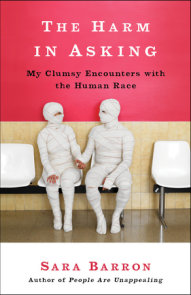READERS GUIDE
The Frailty Myth is definitely a consciousness-raising book. It is also an empowering book in that it will encourage you to think about yourself in new and more active ways. It will affect your ideas about women’s (and girls’) health and well-being, and what schools should be teaching that they aren’t. It will affect the ideas of parents.And if you want to set off a bomb at the next dinner party or barbecue you go to, just bring up the idea of “closing the strength gap.” Drop a few of the facts about women’s strength and endurance that few people know about (and few men want to know about).
For book clubs and reading groups, below are some topics to get your discussions going. You’ll find that each topic corresponds to a particular section of the book listed as a subchapter in the table of contents.
Questions and Topics for Discussion
1. Learned Weakness
1. Is there such a thing as “learned weakness”? How does it happen, and what are its effects in girls? In women? Do girls “naturally” prefer dolls to active play? Is this a myth, or something we teach them? What other so-called gender-appropriate behaviors do we encourage in girls that might contribute to their fear of exercise and eating? What is “perceived physical incompetence”?
2. Is there a connection between women’s bone fragility in later life and learned weakness? Do women make themselves vulnerable to chronic diseases (i.e., osteoporosis, osteoarthritis, heart disease, mood disorders) by underexercising? Are physically weak women more passive?
3. Why do women with a sports background rise higher in their careers?
2. Body Image
1. Are females still being influenced to “stay small”? How, and by whom? Are girls afraid of developing muscle, lest it be a turn-off to boys?
2. Are today’s elite female athletes making a dent in girls’ preconceptions about what’s normal and appreciable in a female body? What do you think is normal and appreciable in a female body?
3. Bone Loss
1. Are all females vulnerable to bone loss? At what age does it start? How early in life do females have to begin bone-loading exercise if they want to avoid osteoporosis? What is the role of estrogen in preventing bone loss?
2. Do women need testosterone? In what ways, and why? Do females ever have a testosterone spurt the way boys do at puberty?
4. What Parents Are Teaching Girls about Strength
1. What ideas about gender might skew the way parents teach girls about physical activity? Are parents still (even subtly) encouraging girls not to go “too far” in developing their bodies, or in being physically active?
2. With proper training, can girls actually throw as far as boys can? Do you “throw like a girl,” and if so, why do you think this is the case?
3. Are our ideas about what puberty does to strength in boys and girls exaggerated, or even wrong?
5. Are Schools Conspiring?
1. Is there prejudice against girls in school phys ed programs? Are boys and girls in your schools given the same fitness tests? If not, why not? What is your own view of this double standard, which is condoned in most schools?
2. Should boys and girls have integrated gym classes? Are girls getting an even shake in most after-school athletic programs?
3. What about female coaches? Are they better for girls and women? Do phys ed teachers unwittingly discriminate against girls? How?
6. Harassment
1. Do boys’ and girls’ ideas about girls’ strength affect the amount of harassment girls experience? Should girls be able to defend themselves, physically, against boys? Do girls have exaggerated ideas about boys’ strength that influences their ability to defend themselves?
2. Should martial arts classes and/or self-defense classes for girls be available in our public schools? Should they be a standard part of the phys ed curriculum?
3. Can women defend themselves against rape? How?
7. Physical Development and Self-destructive Behavior
1. Are girls who exercise less vulnerable to drugs, dropping out, and early pregnancy? Why would this be? What is the connection between fully developed bodies and self-esteem? Ability to do school work? Optimism about the future? Are women who exercise less vulnerable to addictions? Street crime? Abuse on the job?
2. Do women have an exaggerated fear of men’s strength? Are they afraid to defend themselves physically? Is this realistic or misguided? What have we learned about women’s fears from teachers of self-defense programs?
8. Closing the Strength Gap
1. Are women really weaker than men? How do you know?
2. Why are women, in general, stronger than they were fifty years ago? Are they as strong as they can get? Why is that?
3. Why have Olympics officials segregated some sporting events after women have beaten men? Do you think there should be more Olympic events in which men and women compete against each other directly?
4. Are there sports in which women do as well or better than men? Do women have an endurance advantage? Do female hormones confer any advantage? Why have women who appear strong been taunted for being unfeminine, or “like men”? What prejudices or societal pressures are behind these taunts? Does this prejudice influence you or anyone you know?




















